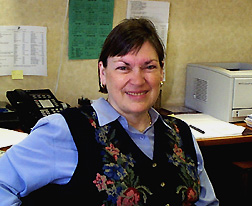
| T H E N I H C A T A L Y S T | J A N U A R Y – F E B R U A R Y 2005 |
|
|
|
E T H I C S F O R U MACCOUNTABLE
AUTHORSHIP:
|
|
 |
|
Joan
Schwartz
|
In July we launched the Research Ethics Computer Course, and I notified all of you about it through a column in The NIH Catalyst (July-August 2004 issue). Since then, I have received approximately 300 comments, via the built-in e-mail address for responses, and am pleased to report that 99 percent of them have been highly complimentary.
Some of the comments have raised stimulating questions about specific topics and/or quiz questions or cases, and the NIH Committee on Scientific Conduct and Ethics has decided to address those. Future issues of the Catalyst will contain responses to issues raised about the cases involving human subjects. We will also write about specific authorship questions regarding one of the cases.
In this column, I would like to address more generic authorship issues raised by three of our intramural scientists. Rose Mage, NIAID, provided a PDF file with the new PNAS authorship criteria, and Germaine Buck Louis, NICHD, noted that the International Committee of Medical Journal Editors has issued new guidelines for the biomedical journals regarding determination of authorship.
One general theme is the need for accountability, because frequently these days authors make specialized contributions to a paper. All the journals are asking that authors describe their specific contributions to the publication, either by checking off appropriate responses from the journal’s list or putting the information into a footnote.
Authors are asked to agree on authorship order based on these contributions. The PNAS guidelines state that the corresponding author should be the guarantor of the paper. The journals agree that "gathering funds for the project, paying salaries, providing a conducive environment, being the spokesperson, or providing published reagents or procedures are not activities that warrant authorship without a significant contribution to the scientific content of the paper" (PNAS 101:10495, 2004). They believe that these criteria will protect against ghost or gratuitous authorship.
These new guidelines represent extensions of the rules for authorship provided in the course. It would be worthwhile to discuss these in one of your future lab meetings.
Paul Kovac, NIDDK, raised a different kind of publication issue of concern to him. In the course module on publication and authorship, page 3 states: "Even though each paper should contain sufficient information for the informed reader to assess its validity, the principal method of scientific verification is not review of submitted or published papers, but the ability of others to replicate the results. Therefore, each paper should contain all the information necessary for other scientists to repeat the work and/or the complete list of references used to conduct the specific experiment." Page 4 makes the following points:
![]() "Scientists should not rush to publish.
"Scientists should not rush to publish.
![]() "Timely publication of new and significant results is important for the
progress of science. But . . .
"Timely publication of new and significant results is important for the
progress of science. But . . .
![]() "Each publication should make a substantial contribution to its field.
"Each publication should make a substantial contribution to its field.
![]() "Fragmentary publication of the results of a scientific investigation or
multiple publications of the same or similar data are not appropriate; e.g.,
using a tactic termed salami slicing or producing lots of LPUs (Least Publishable
Units)."
"Fragmentary publication of the results of a scientific investigation or
multiple publications of the same or similar data are not appropriate; e.g.,
using a tactic termed salami slicing or producing lots of LPUs (Least Publishable
Units)."
Kovac has written a commentary, published in Chemistry & Biodiversity (1:606, 2004), in which he notes that the quality of chemistry papers has been declining despite increasing sophistication of methods, reagents, and instrumentation.
One reason is that the "number of papers whose experimental results cannot be reproduced because of lack of data presented, as well as the number of compounds described for the first time that have not been properly characterized, is increasing at an alarming rate."
Kovac, like many of us, is convinced that "the progress of science is not directly proportional to the number of pages available in journals."
As stated so elegantly by René Dubos (and inscribed on the sculpture bridge in the Science Court of the Hatfield Clinical Research Center): "In science as in other human activities, the speed of progress is less important than its direction."
These comments all address the basic issue of responsible authorship—the need to take responsibility for what is published, to acknowledge properly all the people who contributed to the research and the level of their contributions, and to publish only complete studies with all the necessary details available to enable replication.
Perhaps the most important result of heeding all this advice would be that there might be fewer—and better—journals and articles for busy scientists to read!
—Joan
P. Schwartz
Assistant
Director, OIR